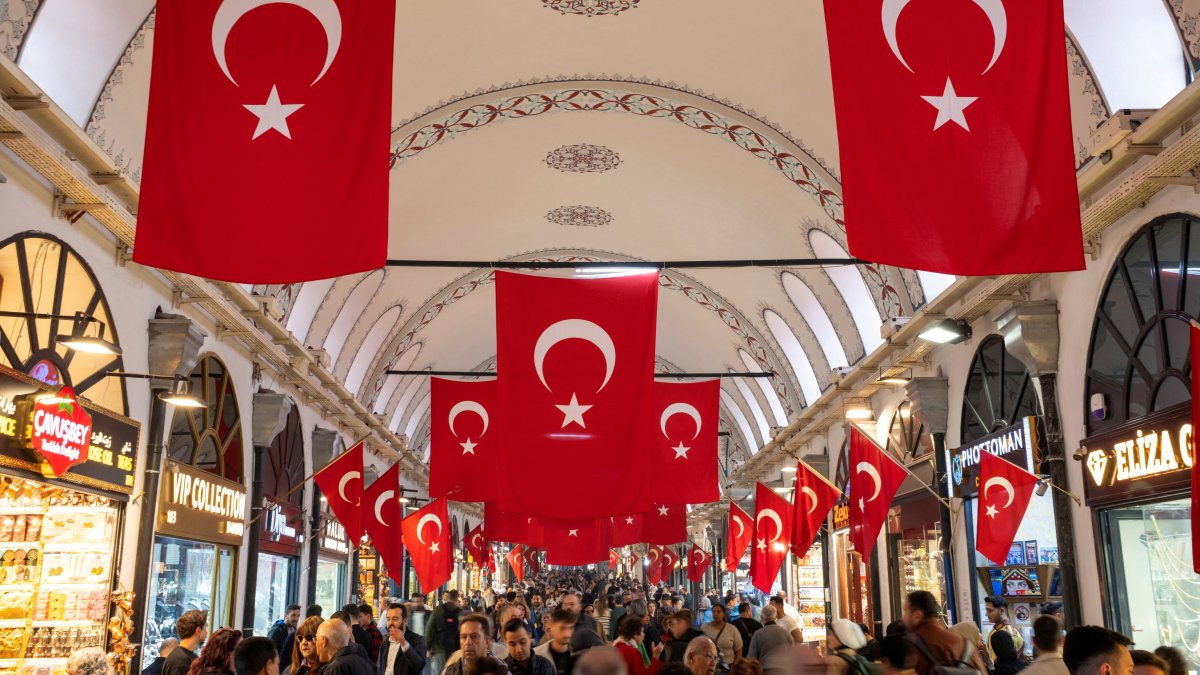Consumer price inflation in Türkiye was higher than expected in August, mainly due to higher food prices, but the annual trend remains downward, according to official data on Wednesday that officials say remains consistent with projections.
The annual inflation softened to 32.95% from 33.52% in July, the Turkish Statistical Institute (TurkStat) said, marking the lowest rate since November 2021, when prices had risen 21.31%.
On a monthly basis, consumer prices rose 2.04%, following a 2.06% increase in July, as food, education and housing prices, as well as the continued impact of a midyear update to taxes on tobacco and fuel items, pushed prices higher.
The decline fell short of expectations as surveys had forecast the annual rate to slow to about 32.6% and monthly inflation to be 1.8%.
That, according to analysts, could prompt the Central Bank of the Republic of Türkiye (CBRT) to slow the pace of its interest rate cuts when its Monetary Policy Committee (MPC) convenes next week.
Investors also continue to monitor the economic impact of Tuesday’s court ruling to suspend Istanbul provincial leadership of the main opposition Republican People’s Party (CHP) over alleged irregularities in a 2023 provincial congress.
That sent Turkish stocks and bonds lower. The Borsa Istanbul Stock Exchange (BIST) closed down 3.57% on Tuesday after earlier sliding more than 5%. Shares in the main BIST 100 index were down 1.8% at Wednesday’s opening.
The Turkish lira appeared unaffected as monetary policy is more important, Frantisek Taborsky, EMEA FX and FI strategist at Dutch financial giant ING, said in a note.
The lira has some appeal as Türkiye’s central bank “appears to have the situation fully under control” and yields remain sufficient, while the bond market appears to be the most sensitive, Taborsky said.
Central bank may slow rate of cuts
The inflation figures also followed data that showed on Monday the economy grew by a stronger-than-expected 4.8% year-over-year in the second quarter, despite a prolonged monetary tightening effort, fueling expectations that the CBRT could scale back its rate-cutting cycle.
“The probability of the central bank cutting rates by 300 basis points in September has become very low” after the growth and inflation data, Hakan Kara, a former central bank chief economist now on the faculty at Bilkent University in Ankara, said on social media platform X.
In July, the central bank cut the benchmark one-week rate by 300 basis points to 43%, relaunching its easing cycle, and said that leading indicators suggest a continued gradual slowdown in the main trend of inflation in August.
CBRT Governor Fatih Karahan on Tuesday said their next steps would be determined depending on the disinflation course.
“The committee will determine its policy rate decisions by taking into account actual inflation, its underlying trend and expectations, in a manner that ensures the level of monetary tightness required by the projected disinflation path,” Karahan told an event in the northwestern province of Bursa.
“The magnitude of policy steps will be reviewed with a cautious, meeting-by-meeting approach, focused on the inflation outlook.”
Economists were expecting the bank to continue its easing cycle and cut rates to 36% by year’s end.
The CBRT estimates inflation will fall to about 24% by the end of the year, with a forecast range of 25-29%.
Food, education, housing fuel monthly rise
Vice President Cevdet Yılmaz and Treasury and Finance Minister Mehmet Şimşek said the higher-than-expected August inflation was largely driven by food prices affected by frost damage and drought, which accounted for about one-third of the monthly increase.
The food and non-alcoholic beverages prices grew by 33.28% on an annual basis, versus 27.95% in July, the TurkStat data showed.
Şimşek said the price increase in the food group was “significantly” above its long-term average and contributed 0.7 percentage points to monthly inflation.
Transportation costs moderated to 24.86% from 26.57%. Similarly, the annual price growth in housing and utilities slowed to 53.27% from 62.01%. Prices for education surged 60.9%.
Still, Yılmaz noted that annual inflation remains consistent with the central bank’s range.
The government is due to announce an update to its medium-term program, which Yılmaz says will include a scope of continued “determined and coordinated” fight against inflation through “comprehensive policy measures.”
Şimşek cited what he said was a continuing slowdown in annual core goods and services prices. “Core goods inflation stood at 19.8%, while services inflation fell to 45.8%, its lowest level since April 2022,” he wrote on social media platform X.
“To ensure lasting price stability, which is a prerequisite for sustainable growth and improved social welfare, we will continue to uphold fiscal discipline and pursue structural reforms with unwavering determination,” said Şimşek.
On a monthly basis, food and non-alcoholic beverages rose 3.02%, transport 1.55% and housing 2.66%.
Annual inflation has dipped from as high as 75% last year, and policymakers are aiming to cut it to 16% by the end of next year and 9% by end-2027, according to CBRT estimates.
Mustafa Kemal Eski, an analyst at Marbaş Menkul Değerler, said in a note that they maintained forecasts for year-end inflation at 30.5% and the policy rate at 35%, but still expected a 200-basis-point cut next week.
However, any expansion in domestic political or global shocks could increase the risk of smaller rate moves, Eski noted.
A separate data from the TurkStat showed that annual producer price inflation rose to a six-month high of 25.16% in August from 24.19% in the previous month.
Prices of mining and quarrying climbed 27.6%, and manufacturing reported a 24.73% rise.
Producer prices of electricity, gas, steam, and air conditioning grew 26.68% and surged 55.35% for water supply.
Month-over-month, producer prices moved up 2.48% after rising 1.73% in the prior month, with more than half of the change attributable to food products and utilities.
